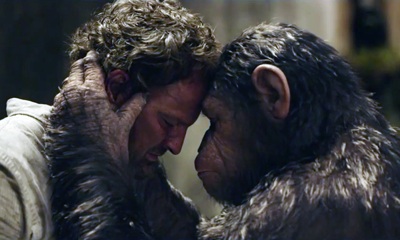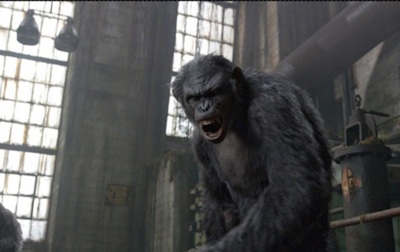 A conversation designed to get you out of the house and into seeing Dawn of the Planet of the Apes this weekend.
A conversation designed to get you out of the house and into seeing Dawn of the Planet of the Apes this weekend.
You’re kind of down on the movies this summer. Yet I hear you think it doesn’t suck. That not only doesn’t it suck, that it’s pretty damned great.
Scared of Transformers, the first sequel made to coddle communist authorities, we were, err, “treated” to a July 4th slate that wouldn’t have passed muster on the iciest weekend in January. Seriously: Tammy? Deliver Us from Evil? Earth to Echo? Earth to Fucking Echo? That echo you hear is the tormented cry of millions yearning to see something other than Michael Bay and his toys kissing ass in China.
And here it is.
But, wait, hold up–you didn’t much care for Rise of the Planet of the Apes. What changed?
Awfully contrived, Rise looked pretty chintzy to boot, and its second-time director, Rupert Wyatt, didn’t seem fully at ease with the material.
(Yeah, it was pretty silly that James Franco wound up ending the world, right?
 To be fair, though, Wyatt was more comfortable than Tim Burton, who blew any chance of restoring the apes my way (distinguished actors under humanoid makeup, getting all the good, pseudo-philosophical lines) with his insipid 2001 redo.
To be fair, though, Wyatt was more comfortable than Tim Burton, who blew any chance of restoring the apes my way (distinguished actors under humanoid makeup, getting all the good, pseudo-philosophical lines) with his insipid 2001 redo.
Matt Reeves, the director of Cloverfield and Let Me In, inhabits this terrain, and knew how to extract what worked about Rise and build on that strength–namely, Andy Serkis as Caesar, who is here ten years older, with a perpetual scowl that suggests the conflicted samurai warriors of Toshiro Mifune. Caesar is curious as to what happened to the humans in his midst, the many wiped out by what we know to be “simian flu.” He finds out, the hard way, when a few remaining people stuck in an ailing San Francisco make their way to his ape-filled city in the Muir Woods, hoping to reactivate a dam and jumpstart civilization with hydroelectric power.
And?
It doesn’t go well. Suspicion, fear, and our guns are a potent mix for trouble. But against the against the advice of the hot-headed Dreyfus (Gary Oldman), co-founder of the San Francisco community of survivors, Malcolm (Jason Clarke) mounts a second expedition to defuse the crisis and make amends. One of my beefs with Rise was that the human actors didn’t uphold their end of the movie. But Clarke, a strongly built actor with a gentle face (he was the empathetic torturer in Zero Dark Thirty), is terrific, even if our representatives are overall less compelling than our ancestors’. (Though acted with gusto, Oldman’s role is fairly small, and Keri Russell and company don’t have much to do. But they sell the illusion of communicating with walking, talking, grunting, signing motion-capture apes, which is key.)
How are the apes?
Fantastic. But I want to mention something else first.
Yes…?
The movie is strongly, strongly, anti-gun.
Groan! I don’t want to see anything political.
It isn’t, in that no one makes speeches about weapons in the post-apocalyptic world. Given that the movie has plenty of militaristic thrills in its final pitched battle sequence, that would be mealy-mouthed. But when was the last time you really felt the threat of a gun in a mainstream movie? You really feel it here, and it’s uncomfortable, properly so. Without saying much, Dawn speaks volumes about the abuses of gun culture–and expect your favorite bloviating commentators to be chattering about this by Monday.
Ok, fine. So…how are the apes?
Serkis is incredible here. Worthy of a special Oscar for distinguished achievement, if AMPAS continues to frown on mo-cap acting. A stirring, deeply thought and lived in portrayal. You feel Caesar’s pain and agony as fault shifts from human to ape as the conflict escalates and battle lines are drawn. So good. But…
The movie is pretty much stolen by Koba, portrayed by Toby Kebbell. Koba, who bears the scars of human experimentation, is a confederate of Caesar’s who wants nothing to do with our society, and will do anything to maintain segregation. (Including, in a pair of delightful sequences, playing the fool for human weapon keepers.) Koba is a classic movie villain, menacing yet sympathetic. Even as he passes the point of no return, morally, he has a point to make. “Human work! Human work!” I love Koba.
And what else did you love about Dawn?
When Malcolm enters “Ape City” alone, it’s a starkly scary sequence, like something out of Werner Herzog and Aguirre, the Wrath of God. There’s none of the backlot pastoralism of the older films. These communicative apes are creepy and powerful and unsettling, and with apologies to Kim Hunter and Roddy McDowall (love you guys) I’ve habituated myself to them. There is a cute ape baby and an inquisitive orangutan named “Maurice,” which is about as far as this movie goes with homages. Mostly, though, the stars of the show are kind of frightening, even noble-ish Caesar in his funks. They have an edge.
And I love how the original writing team of Rick Jaffa and Amanda Silver, with Mark Bomback, has moved past the stilted origins story and complicated things. The Apes cycle went from original to sequel to time-traveling prequels; this is straightforward, and I have no idea where it’s going next. I love that.
I love that it’s not cheap. The money is on the screen.
I love that it was filmed in 3D, and not post-converted…but, to be honest, other than the opening sequence and the swinging ending, it didn’t do all that much for me. It’s a wash and if you’d rather not pay the damned surcharge I don’t think you’ll be missing much.
I love that the movie redeems a flat summer. Earth to Echo my ass. Caesar’s large and in charge now.
Sold. To sum up…?
Dawn of the Planet of the Apes is the best time I’ve had at the movies all year.






Comments